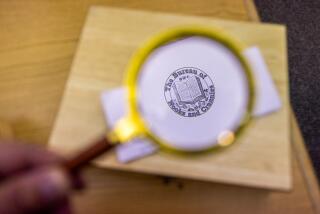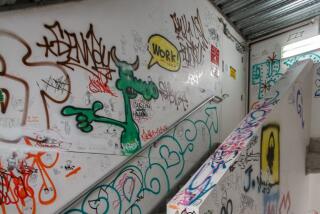Color Crayola’s Strategy Creative
- Share via
From cerulean blue to magenta, a kaleidoscope of colors dazzles the eyes at Crayola’s first-ever retail venture at Arundel Mills mall in Hanover, Md.
Sure, scores of crayons, as well as markers, paints and clay, are sold at the store, called Crayola Works Creativity Studio and Store. But half of the 20,000-square-foot space is an art studio, where visitors can buy craft kits, sit at tables and color, paint and individualize them.
For the record:
12:00 a.m. Sept. 6, 2002 For The Record
Los Angeles Times Friday September 06, 2002 Home Edition Main News Part A Page 2 National Desk 6 inches; 223 words Type of Material: Correction
Wrong state--A Baltimore Sun story about Crayola’s retail store in Maryland that appeared in Thursday’s Southern California Living gave an incorrect location for the Crayola Factory. The factory and hands-on visitor center is in Easton, Pa., not Easton, Md.
Crayola Works taps into the concept of entertainment retailing--one of the hottest trends in retail--where consumers are offered not only a product, but also a fun and engaging in-store experience that helps build brand loyalty for companies.
The hot seller so far? A soccer ball that people can color and customize.
For Crayola, one of the most identifiable brands in America, the store is an experimental first step in a possible roll-out of similar stores across the country. It’s a bold new direction for 99-year-old Binney & Smith, the Easton, Pa., maker of Crayola products that is more accustomed to the role of manufacturer than retailer.
The store will appeal to children who don’t mind getting sloppy when creating works of art, according to Nancy DeBellis, Crayola’s director of retail. “And parents don’t have to worry about cleaning up.”
A pathway called a “river of color” winds through the store. Boxes of markers and crayons line shelves and walls throughout. A new Volkswagen Beetle--painted half black and half white--waits in one corner for people to grab markers and write, draw and color on it.
Buying a craft kit, for as little as $5.99, grants a visitor access to the 200-seat art studio, where art supplies are free and there is no time limit.
The store, open since early June, plans to change its menu of craft kits regularly to keep the interest level high.
“They’re not just trying to sell you something and kick you out,” said Gay Smoak, a 40-year-old homemaker from Severn, Md., who visited the store recently with her sons Michael, 12, and Brian, 10.
“It’s an activity that you could sit here for an hour and a half and do. There aren’t too many places you can go out with kids and do something together without spending a fortune.”
Binney & Smith, a subsidiary of Hallmark Cards Inc., was encouraged to launch the retail project partly from its success with the Crayola Factory in Easton, Md., a hands-on visitors center that demonstrates the crayon-making process.
But the private company, which made about $500 million last year, was also nudged into the venture by Mills Corp., Arundel Mills’ owner, which came up with the idea for a Crayola store and then pitched it to the company, officials from both companies said.
“Crayola is just a formidable organization,” said Mark J. Rivers, Mills’ executive vice president and chief strategic officer. “They’re a market leader in children’s art and expression. We love partnerships with pedigree.”
Arundel Mills is an ideal first spot for Crayola. The mall is a potent regional attraction that drew 14 million visitors last year. And it’s nestled between Baltimore and Washington in a market that Binney & Smith says holds 1.4 million children between 2 and 12.
Tapping that demographic is key to the store’s success, said retail consultant Mike Rubin of MRA International Inc. of Philadelphia. Rubin, a well-known expert in the field of experiential and entertainment retailing, worked with Crayola and Mills to develop the store’s business model.
“The goal was to have the parents very much engaged,” Rubin said.
The store enables children to color and draw with their parents, or parents can drop off their children for an art class or workshop, go mall shopping and pick them up 1 1/2 hours later. A small coffee shop is planned for one corner of the studio, for parents waiting for their children.
“This had to work as a business, but at the same time we wanted to push the envelope on what the experience can be,” Rubin said.
Neither Crayola nor Mills will say how much was spent on the store, but Crayola doesn’t have an exclusive relationship with Mills, officials from both companies said.
Gus G. Sentementes is a reporter for the Baltimore Sun, a Tribune company.
More to Read
Inside the business of entertainment
The Wide Shot brings you news, analysis and insights on everything from streaming wars to production — and what it all means for the future.
You may occasionally receive promotional content from the Los Angeles Times.










